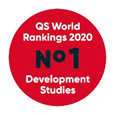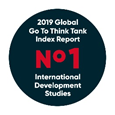Monitoring Evaluation and Learning Specialist (08-2023)
| Hours per week: Full Time, 35 hours per week |
| Contract Type: Permanent |
| Grade: Grade 6 |
| Salary: £28667 to £42325 per annum |
| Closing Date: 23.59 hours BST on Tuesday 13 June 2023 |
Who We Are
The Institute of Development Studies (IDS) is a global leading institution for research, teaching and learning, and impact and communications, based at the University of Sussex. We are ranked first in the world for development studies by the QS University Rankings, together with the University of Sussex. We are also ranked best international development policy think tank.
Our Vision
Our vision is of equal and sustainable societies, locally and globally, where people everywhere can live their lives free from poverty and injustice. We contribute to this by transforming the knowledge, action and leadership needed through our world-class research, learning and teaching.
Our Values
We aim to ensure that our core values based on respect, resourcefulness, excellence and inclusivity are reflected in the environment we work in.
Our Commitments
• Upholding climate and environmental justice
• Reducing extreme inequities
• Fostering healthy and fulfilling lives
• Nurturing inclusive, democratic and accountable societies
Our Priorities
• Collaborate across sciences, sectors and communities to do research that brings about progressive change
• Build future leadership for development
• Champion the use of evidence for social and environmental justice
• Work with partners to expand international research and mutual learning networks for development
• Create a sustainable, resilient and equitable institution.
For more information go to: www.ids.ac.uk


Job Description
Overall purpose of the role
The MEL Specialist will be based at IDS as part of the MEL Team within the Knowledge Impact and Policy Cluster. The post holder’s work will be focused on MEL of research and knowledge engagement projects. The core duties will be to manage and implement a portfolio of MEL work that contributes to the Institute’s goals. This will include, designing and implementing MEL plans and theories of change, processing and analysis of MEL data, designing and implementing evaluations and facilitating learning and reflection spaces to contribute to an innovative portfolio of work across diverse thematic areas of research. Given the range of responsibilities and tasks of this position, the post-holder will be expected to manage competing responsibilities with support on setting priorities from their line manager.
Main Duties and Responsibilities
Lead a programme of MEL work
Build relationships with research clusters across the Institute to strengthen awareness and understanding of MEL processes and get buy-in to establish effective MEL systems.
Represent IDS with key donors, partners and other development actors in order to respond to MEL needs and requests, including identifying funding opportunities.
Lead on the design and delivery of MEL processes across a diverse portfolio of research projects and programmes across at all stages of the project cycle. Develop and implement theories of change, logframes and MEL frameworks, establish strong communication protocols, manage monitoring and reporting and documentation of lessons learnt and advise on evaluation design.
Contribute to annual and quarterly programme progress reporting, develop reporting templates and compile data, update and maintain databases and logframes and support any additional data analysis or synthesis to meet funder reporting requirements. Coordinate report delivery and roles and responsibilities with Project Managers.
Identify the most appropriate methodologies and tools for data collection and analysis and develop data management and tracking tools. Collect and process diverse types of data, including desk research of literature, quantitative and qualitative data.
Lead processes to collect and analyse primary qualitative data from key informant interviews, focus groups and workshops with partners and stakeholders and provide a synthesis of outcomes identified and/or lessons learnt.
Develop impact stories that provide evidence of how research evidence and engagement activities have influenced decision makers and other key stakeholders attitudes and behaviours and contributed to policy conversations.
Be a champion for learning
Design and deliver Learning Journeys with funders and other development agencies to facilitate accompanied organisational learning around MEL relevant questions or processes, defining learning questions, facilitating reflection spaces, developing, and validating recommendations and producing learning reports.
Facilitate strategic discussions to develop theories of change and impact pathways to support IDS projects/programmes to inform management decision making navigate complexity and trade-offs around prioritisation and resource allocation in project design and to support to process and act upon learning.
Lead by example, and implement reflective practice throughout your work, for example keep appropriate records, undertake reflective exercises at appropriate points in a project cycle, proactively seek opportunities to learn from others and to share lessons from your own work.
Keep abreast of the latest theory and practice, document new MEL approaches and tools developed in your work and share reflections on how IDS supports change with the international development community.
Produce? learning resources, papers and presentations on MEL for development and learning and share these in relevant conferences and networks.
Provide technical support and build capacity of others to undertake MEL.
Provide capacity development, MEL mentoring and 1-2-1 advice with consortium and in-country partners where appropriate.
Deliver technical training on MEL through facilitation of short courses and bespoke partner workshops, involving preparing guidance notes, workshops design and facilitation, and feedback to course / workshop participants.
Work as part of a team
Play a key role as a member of various project teams across research clusters, through inputting into plans and proposal development processes and providing MLE support for project design.
Input to ongoing KIP plans and proposal development processes including negotiating MEL time in project proposals and new projects.
Work closely with MEL team and programme colleagues to ensure effective team organisation, co-ordination, and communication activities.
Mentoring /supervision of other team members on specific projects/programmes.
Play an active role within IDS, particularly on monitoring, evaluation and learning matters.
Equalities
You must be prepared to implement the Institute’s Equal Opportunities Policy at a level appropriate to the job and must at all times carry out your duties with due regard to the Institute’s Equal Opportunities Policy.
Health and Safety
You must be prepared to be responsible for the implementation of, and compliance with, the provisions of legislation relating to the health and safety of such employees and areas of the workplace as fall under your direct control and for complying with legislation relating to such works and contracts as are within your direct responsibility.
General
You will be required to undertake such other duties appropriate to the grade and character of the work as may reasonably be required of you. Therefore, the list of duties in this job description should not be regarded as exclusive or exhaustive.
Your duties will be set out in this job description but please note that the Institute reserves the right to update your job description, from time to time, to reflect changes in, or to, your job. Significant permanent changes in duties and responsibilities will require agreed revisions to be made to this job description. You will be consulted about any proposed changes.
Person Specification
Skills and experience
| Selection Criteria Description | Essential [E] or Desirable [D] |
Assessed by * |
|
| Qualifications | |||
| • Post graduate degree in social sciences, international development or related field. | E | A/I | |
| Knowledge | |||
| • Working knowledge of MEL relevant debates, methodologies and analytical software and ability to apply this knowledge to diverse programme structures and areas of thematic focus. • Knowledge of evaluation theories and methodologies, their relative strengths and weaknesses in different contexts and how these can be applied to measure the impact of research and knowledge work. • Knowledge of participatory methods and facilitation tools and approaches. • Understanding of the research to policy arena and theories and frameworks around evidence-based decision making. • Knowledge of data management systems and procedures. |
E | A/I | |
| • Knowledge of current development debates across a range of disciplines and themes. • Fluency in languages other than English. |
D | A/I | |
| Skills | |||
| • Excellent written and verbal communications skills, and ability to express complex ideas in concise and accessible language. Strong analytical skills and ability to produce reports to a high professional standard. • Strong interpersonal skills, including relationship-building, influencing and negotiating. • Excellent numeracy skills with an understanding of standard data handling processes and with the ability to develop and manipulate data. • Strong presentation skills and ability to produce and present compelling Powerpoint and other types of presentation. • Stakeholder and systems mapping. |
E | A/I | |
| • Statistical data analysis using Excel, STATA, R or Power BI. | D | A/I | |
| Experience | |||
| • Design and implementation of Theories of Change and MEL systems in diverse development contexts and applications of both standard and innovative tools and approaches. • Significant facilitation experience, including with culturally diverse groups of stakeholders. • Evaluation design, delivery and/or management. • Leading learning activities and generating evidence to inform programmatic and organisational decision making. • Working in a programme environment with external stakeholders and across cultures, ranging from senior decision makers to community-based organisations. • Resource management (Time, money, people as appropriate to project / programme delivery). • Experience of delivering capacity building and training. |
E | A/I | |
| • Experience with knowledge management and communications. • Production of literature reviews and assessing the quality of evidence. • Undertaking action research. • Experience of working in fragile and conflict affected settings and dealing with sensitive data. |
D | A/I | |
| Attributes | |||
| • Proactive and enthusiastic approach. • Attention to detail and a commitment to the quality of outputs. • Ability to work within a team as well as ability to work with minimal supervision within agreed guidelines. • Ability to work systematically and coordinate and prioritise multiple tasks, to tight deadlines. • Ability to assert oneself and ask for assistance or clarification if required. |
E | A/I | |
| Other | |||
| • There may be some UK and international travel involved in this role. | E | A/I | |
Information to Candidates
Benefits At IDS we offer a number of additional benefits to staff. These include:
- a competitive salary, including cost of living awards and incremental increases on an annual basis as per policy and the option to join our pension scheme.
- interest free travel loans, following successful completion of a probationary period
- support in attainment of a relevant professional qualification in line with the Professional Development Policy
- childcare fund
- competitive maternity and paternity policies that offer compensation above the statutory minimum
- 24 days annual leave per year (pro-rata for part-time), plus public holidays and up to 6 non-negotiable closure days
- enhanced sickness pay entitlements
- support with relocation costs for staff joining us from outside the EU
- eligibility to use the University of Sussex gym and sporting facilities at staff rates
Location
The successful candidate will be based at the Institute of Development Studies on the University of Sussex campus. The University of Sussex is located 10 minutes away from the lively and cosmopolitan seaside city of Brighton on the UK South Coast, 60 minutes away from central London, 30 minutes away from London Gatwick Airport and is surrounded by the beautiful countryside of the Sussex South Downs. Situated between the sea and the South Downs, Brighton is one of the most vibrant and unique cities on the South Coast, for more information please go to http://www.visitbrighton.com/
How to apply
Please apply using the online application form.